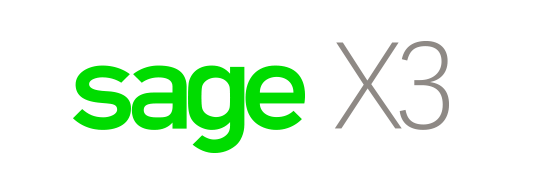Sage ERP
Within the business software industry Sage ERP is a market leader for ERP solutions. Sage has a number of enterprise resource planning software products which it offers to both small, medium and larger businesses that can accomodate the needs of many industries.
This guide will explain all you need to know about Sage ERP including company information, history, product set and financials. We also cover the origins of Sage as an organization and what it’s current status is in today’s competitive SaaS and ERP marketplace.
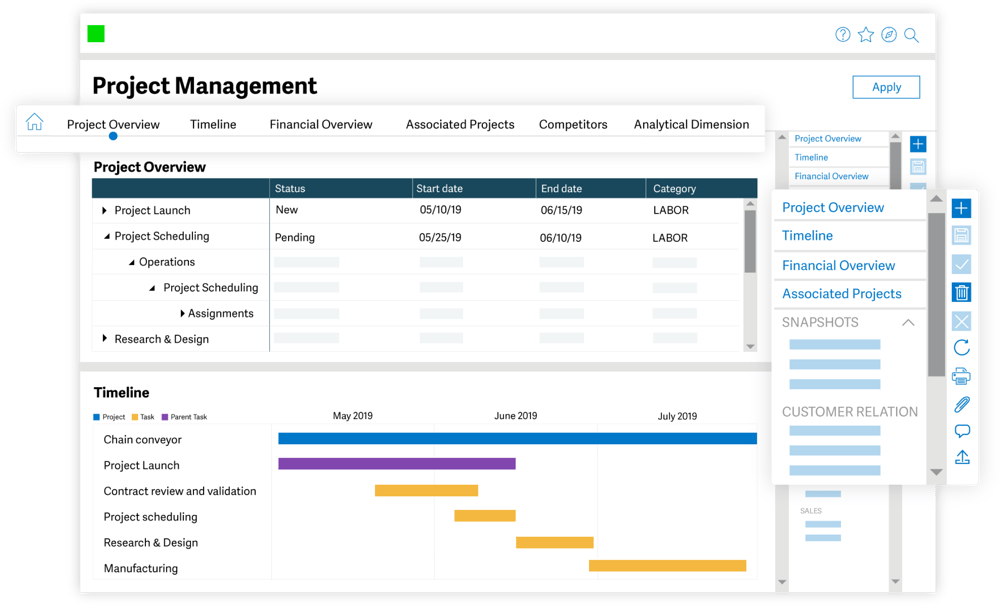
Sage ERP Systems:
Sage Intacct
Sage Intacct ERP (Enterprise Resource Planning) is a cloud-based financial management and accounting software designed for small to mid-sized businesses. It offers a variety of features and modules to streamline financial processes, improve reporting and compliance, and provide better visibility into the organization's financial health.
Sage Intacct ERP Modules:
- Core Financials: This module covers the essential financial management functions such as General Ledger, Accounts Payable, Accounts Receivable, Cash Management, and Order Management. It helps businesses automate and streamline their accounting processes while maintaining compliance with accounting standards and regulations.
- Purchasing: The Purchasing module streamlines the procurement process by automating purchase order creation, approval, and tracking. It also helps manage vendor relationships and ensures accurate, on-time payments.
- Sales and Use Tax: This module simplifies sales and use tax calculations, compliance, and reporting. It helps businesses maintain accurate tax rates and rules, automate tax calculations, and generate tax reports for various jurisdictions.
- Inventory Management: This module manages inventory levels, costs, and item information. It offers real-time visibility into inventory quantities, valuations, and movement, helping businesses optimize their inventory levels and reduce stockouts and overstocks.
- Order Management: The Order Management module streamlines the order-to-cash process, managing sales orders, returns, and customer credit limits. It helps businesses improve order processing efficiency and customer satisfaction.
- Project Accounting: This module provides visibility into project performance, helping businesses track project costs, revenues, and profitability. It integrates with other modules like Time and Expense Management to simplify project billing and ensure accurate revenue recognition.
- Time and Expense Management: This module simplifies time and expense tracking, approval, and reimbursement processes. It helps businesses accurately capture employee time and expenses, improve productivity, and maintain compliance with labor laws and regulations.
- Revenue Management: The Revenue Management module automates revenue recognition, ensuring compliance with accounting standards like ASC 606 and IFRS 15. It helps businesses accurately recognize revenue from contracts, subscriptions, and other arrangements.
- Fixed Assets: This module manages the entire fixed assets lifecycle, from acquisition to disposal. It automates asset depreciation calculations, tracks maintenance schedules, and provides detailed reporting on asset values and depreciation expenses.
- Reporting and Dashboards: The Reporting and Dashboards module offers real-time, customizable reports and dashboards to provide businesses with better visibility into their financial performance. It enables users to create, modify, and share reports and dashboards with ease.
- Global Consolidations: This module simplifies multi-entity and multi-currency financial consolidations. It enables businesses to manage multiple entities, currencies, and reporting requirements with ease, ensuring accurate financial reporting and compliance.
- Integration and APIs: Sage Intacct ERP offers integration capabilities and APIs that enable businesses to connect their financial management system with other software systems like CRM, HR, and payroll. This helps improve overall business efficiency by streamlining data flow between systems.
Which businesses use Sage Intacct?
Sage Intacct is a cloud-based Enterprise Resource Planning (ERP) software that is well-suited for a variety of business types, particularly those in need of strong financial management and reporting capabilities. Here are some types of businesses that typically find Sage Intacct to be a good fit:
-
Service-Based Businesses: Companies that provide professional services, such as consulting firms, marketing agencies, and law firms, can benefit from Sage Intacct’s project accounting and time and expense management features.
-
Non-Profit Organizations: Sage Intacct offers functionalities that are particularly beneficial for non-profits, such as fund accounting, grant tracking, and donor management.
-
Software and SaaS Companies: These businesses can take advantage of Sage Intacct’s subscription billing, revenue recognition, and financial metrics tracking features.
-
Healthcare Providers: Medical practices, clinics, and other healthcare providers can use Sage Intacct to manage their finances, track patient billing, and handle other accounting needs specific to the healthcare industry.
-
Retailers and E-commerce Businesses: Sage Intacct helps these businesses manage inventory, handle order processing, and track sales and revenue.
-
Wholesale and Distribution Companies: These businesses can benefit from Sage Intacct’s inventory management, order processing, and supply chain management features.
-
Franchises: Sage Intacct can help franchise businesses manage finances across multiple locations, handle royalty fees, and consolidate financial reporting.
-
Hospitality and Food Service: Restaurants, hotels, and other businesses in the hospitality industry can use Sage Intacct to manage their finances, track inventory, and handle payroll.
-
Real Estate and Property Management: These businesses can use Sage Intacct to manage property portfolios, track lease agreements, and handle property maintenance finances.
-
Construction and Contracting: Sage Intacct helps these businesses manage project costs, track job progress, and handle billing and invoicing.
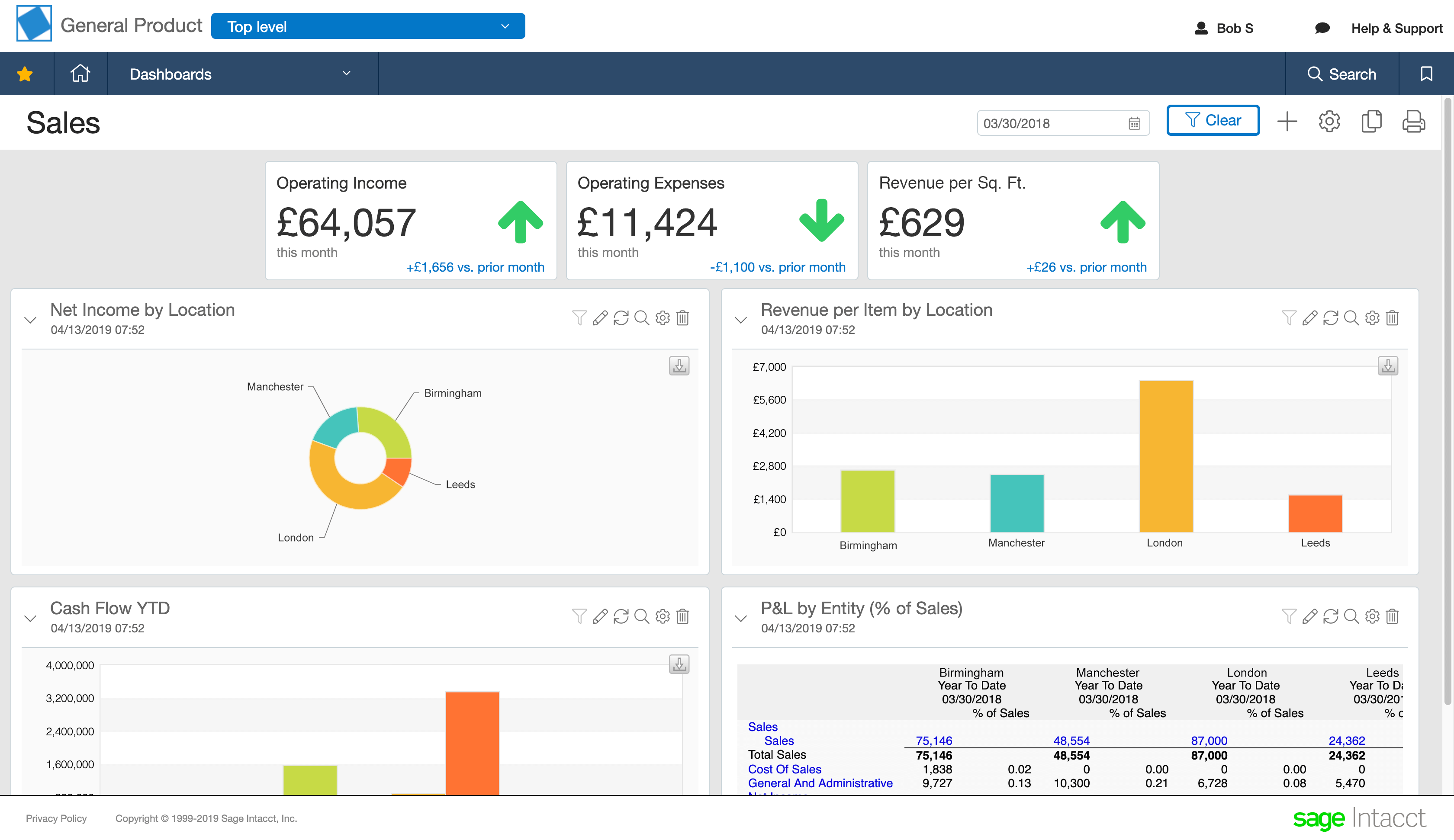
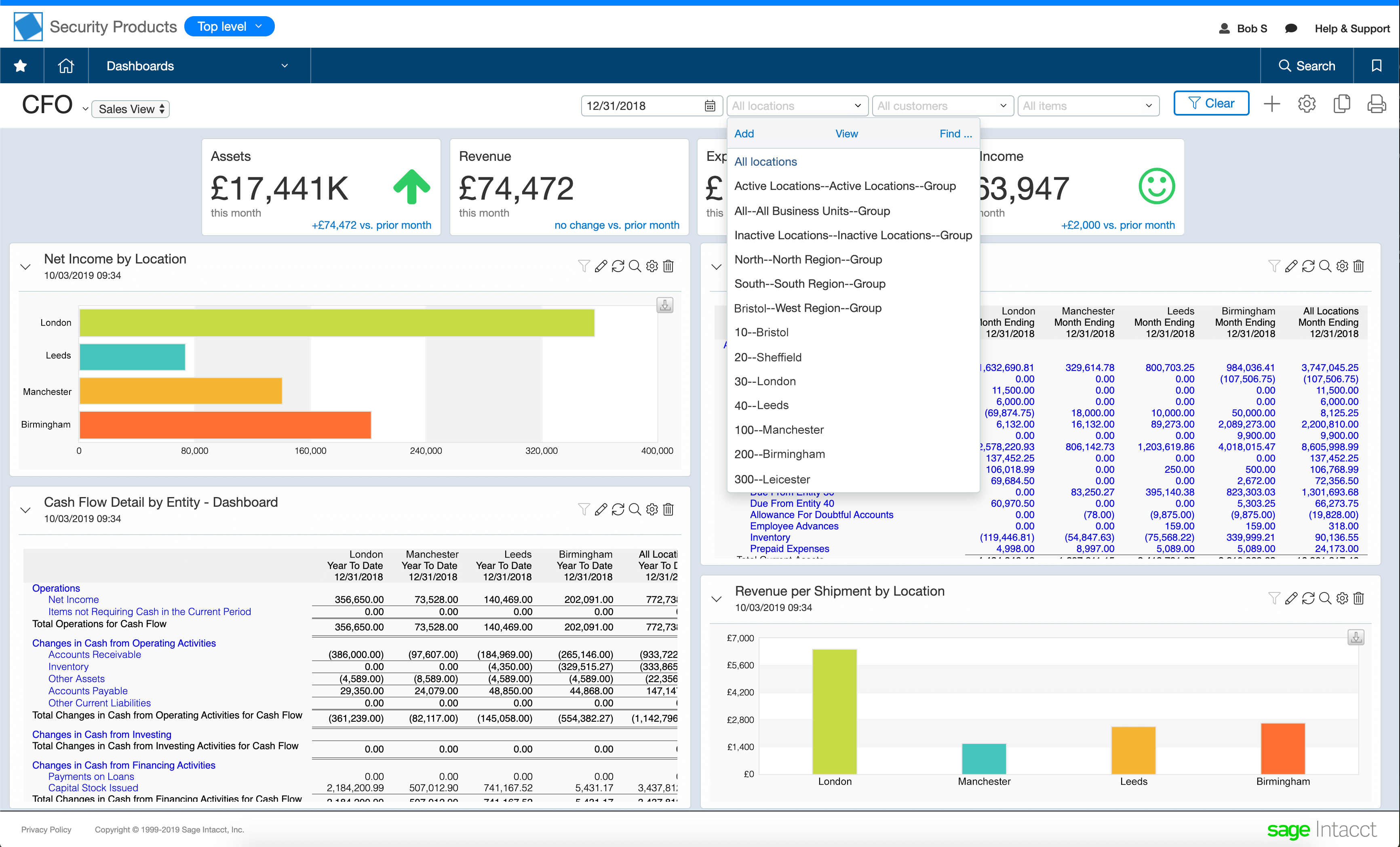
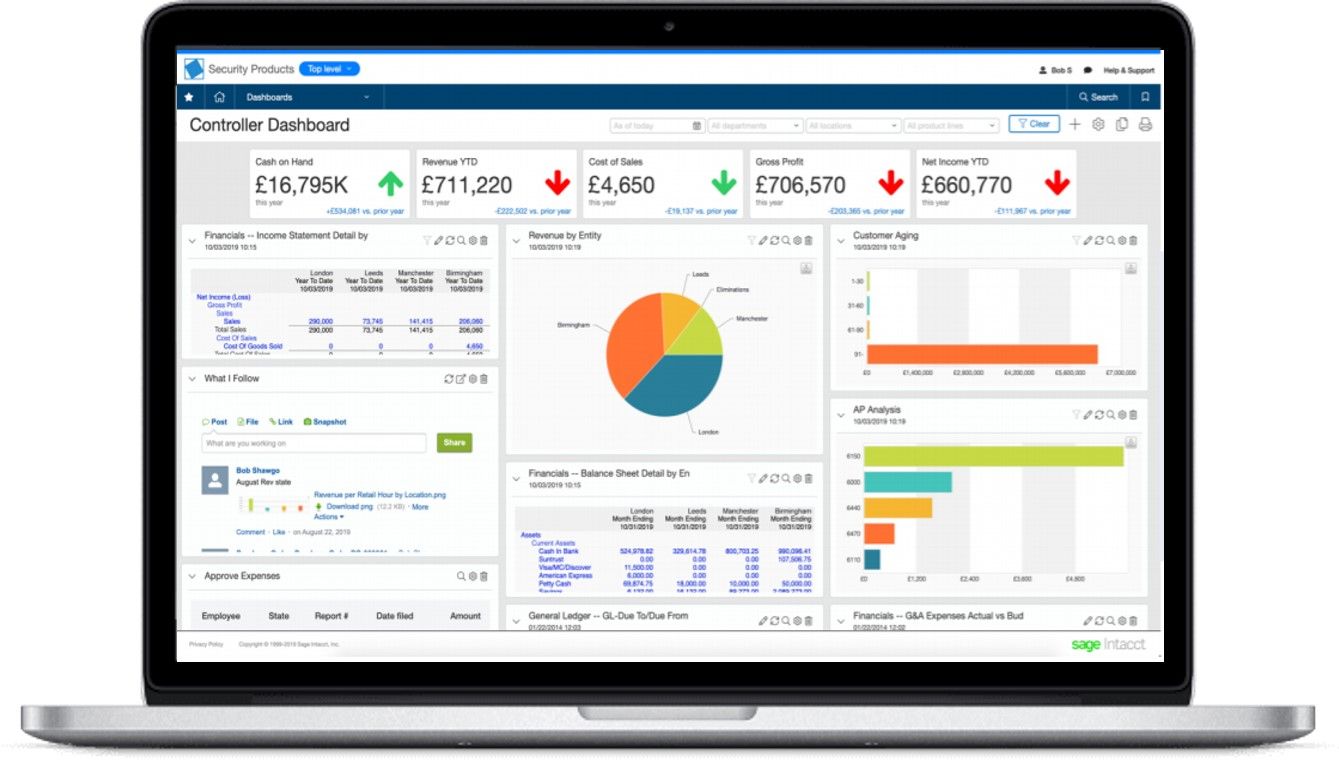
Sage X3
Sage X3 (also known as Sage Business Cloud X3) is an Enterprise Resource Planning (ERP) software designed for mid-sized businesses, particularly those with complex operations and requirements. It helps companies manage their finance, operations, and distribution processes more efficiently, enabling them to grow and adapt to changing business needs.
Sage X3 ERP Modules:
-
Finance and Accounting: This module provides a comprehensive financial management solution, including General Ledger, Accounts Payable, Accounts Receivable, Fixed Assets, Bank Management, and Cash Management. It helps businesses maintain accurate financial records, improve cash flow, and ensure compliance with accounting standards and regulations.
-
Sales Management: The Sales Management module enables businesses to manage the entire sales cycle, from quotes to orders, invoices, and returns. It also provides tools to manage pricing, promotions, and discounts, helping businesses optimize their sales processes and improve customer satisfaction.
-
Purchasing and Procurement: This module streamlines the purchasing process, including purchase requisitions, orders, receipts, and invoices. It also helps businesses manage supplier relationships, track supplier performance, and ensure timely and accurate payments.
-
Inventory Management: The Inventory Management module offers real-time visibility into inventory levels, movement, and valuation. It helps businesses optimize inventory levels, reduce stockouts and overstocks, and improve overall inventory control.
-
Production Management: This module helps businesses manage their production processes, from planning and scheduling to execution and quality control. It offers tools for managing bills of materials, work orders, routing, and capacity planning, helping businesses improve efficiency and reduce production costs.
-
Supply Chain Management: This module enables businesses to manage their end-to-end supply chain processes, including demand planning, distribution, and logistics. It helps businesses optimize their supply chain operations, reducing lead times and improving customer service.
-
Project Management: The Project Management module provides tools to manage projects, track costs, and monitor progress. It helps businesses improve project performance, ensure timely completion, and optimize project profitability.
-
Customer Relationship Management (CRM): This module helps businesses manage their customer relationships, from lead generation to sales, support, and customer retention. It offers tools for managing contacts, opportunities, quotes, and sales orders, as well as tracking customer interactions and analyzing customer data.
-
Human Resources (HR) Management: The HR Management module provides tools to manage employee data, payroll, and benefits, as well as track time and attendance. It helps businesses streamline their HR processes and ensure compliance with labor laws and regulations.
-
Business Intelligence (BI) and Reporting: Sage X3 offers built-in business intelligence and reporting tools that provide real-time visibility into business performance. Users can create custom reports and dashboards, analyze data, and make data-driven decisions to improve business outcomes.
-
Workflow and Process Management: This module enables businesses to automate and streamline their business processes through configurable workflows. It helps improve efficiency, reduce manual errors, and ensure consistent execution of business processes.
-
Integration and APIs: Sage X3 provides integration capabilities and APIs that allow businesses to connect their ERP system with other software systems like CRM, HR, and payroll. This helps improve overall business efficiency by streamlining data flow between systems.
Which kinds of businesses typically use Sage X3?
Sage X3, also known as Sage Enterprise Management, is a comprehensive Enterprise Resource Planning (ERP) solution designed to meet the needs of medium to large businesses across various industries. It offers a wide range of functionalities, making it suitable for businesses looking for an integrated and scalable solution to manage their operations. Here are some types of businesses that typically find Sage X3 to be a good fit:
-
Manufacturing: Sage X3 offers strong manufacturing capabilities, including production planning, inventory management, and quality control. It is well-suited for both discrete and process manufacturers.
-
Distribution: Distributors can benefit from Sage X3’s inventory management, order processing, and supply chain management features. It also provides tools for managing multiple warehouses and transportation logistics.
-
Food and Beverage: Sage X3 provides specific functionalities for the food and beverage industry, including batch traceability, recipe management, and compliance with food safety regulations.
-
Chemicals: Companies in the chemical industry can use Sage X3 to manage formulas, comply with industry regulations, and handle quality control.
-
Pharmaceuticals: Sage X3 offers batch traceability, quality control, and compliance management features that are crucial for pharmaceutical companies.
-
Wholesale and Retail: Retailers and wholesalers can manage inventory, handle order processing, and track customer interactions with Sage X3.
-
Services: Service-based businesses, including professional services and project-based companies, can use Sage X3 to manage project accounting, billing, and resource allocation.
-
Construction and Real Estate: Sage X3 provides tools for managing project costs, tracking job progress, and handling contracts and billing.
-
Automotive: Companies in the automotive industry can benefit from Sage X3’s supply chain management, inventory control, and production planning features.
-
Electronics and High Tech: Sage X3 offers functionalities for managing complex supply chains, production processes, and product lifecycles.
Sage X3 is known for its flexibility and configurability, making it a good fit for businesses with unique or complex processes. It also provides strong international capabilities, including support for multiple languages, currencies, and local regulations, making it a suitable choice for businesses with global operations. Additionally, Sage X3’s web-based interface allows for easy access from anywhere, providing businesses with the flexibility they need to manage their operations on the go.
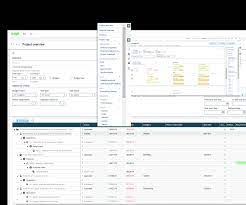

Sage ERP Comparison
| Features/Capabilities | Sage Intacct | Sage X3 |
|---|---|---|
| Target Market | Small to mid-sized businesses | Mid-sized businesses with complex operations |
| Deployment | Cloud-based | On-premise, cloud, or hybrid |
| Core Financials | Yes, comprehensive financial management | Yes, comprehensive financial management |
| Sales Management | Order management | Full sales cycle management |
| Purchasing & Procurement | Yes, purchasing module | Yes, comprehensive procurement management |
| Inventory Management | Yes | Yes, with advanced features |
| Production Management | Not a primary focus | Yes, comprehensive production management |
| Supply Chain Management | Limited | Yes, end-to-end supply chain management |
| Project Accounting | Yes | Yes, with more advanced features |
| Time & Expense Management | Yes | Limited, may require integration |
| Revenue Management | Yes, advanced revenue recognition | Basic revenue management |
| Fixed Assets | Yes | Yes |
| CRM | Limited, requires integration with third-party solutions | Yes, built-in CRM module |
| HR Management | Limited, requires integration with third-party solutions | Yes, built-in HR module |
| BI and Reporting | Yes, customizable reporting and dashboards | Yes, built-in BI and reporting tools |
| Workflow & Process Management | Limited | Yes, advanced workflow and process management |
| Global Consolidations | Yes | Yes, with more advanced multi-entity management |
| Integration & APIs | Yes, integration with other software systems | Yes, integration with other software systems |
Sage ERP Competitors & Alternatives
FinancialForce
![]()
FinancialForce is a cloud-based ERP solution built on the Salesforce platform, designed to streamline and automate financial and operational processes for businesses of various sizes. It offers comprehensive modules for finance and accounting, professional services automation (PSA), human resources management, and supply chain management. By leveraging the power of Salesforce, FinancialForce provides seamless integration with Salesforce CRM, enabling businesses to gain a unified view of their customers and operations. Its user-friendly interface, customizable reporting, and real-time analytics help organizations make data-driven decisions and enhance their overall efficiency.
Oracle NetSuite

NetSuite is a leading cloud-based ERP solution designed to help businesses of all sizes streamline their financial, operational, and customer relationship management processes. It offers a comprehensive suite of modules, including financial management, inventory management, order management, e-commerce, CRM, and human resources. As a scalable and customizable platform, NetSuite allows businesses to grow and adapt to changing market conditions with ease. With its real-time analytics, robust reporting capabilities, and seamless integrations with other software systems, NetSuite empowers organizations to make data-driven decisions and improve overall efficiency.
SAP Business One
![]()
SAP Business One is an all-in-one business management solution designed for small and mid-sized businesses looking for a comprehensive ERP system. One of the notable features of SAP Business One is its ability to integrate with other SAP solutions, making it an excellent choice for companies that already use SAP products. NetSuite, on the other hand, is a cloud-based ERP system that offers a broad range of functionalities, including financials, CRM, inventory management, and e-commerce. While both systems offer similar features, NetSuite's cloud-based platform provides businesses with more flexibility and scalability, making it an ideal option for growing businesses.
Acumatica
![]()
Acumatica is a cloud-based ERP solution that offers comprehensive functionality for businesses of all sizes. Designed for flexibility and scalability, Acumatica provides a modern user interface, advanced reporting tools, and seamless integration with third-party applications. Compared to Netsuite, Acumatica is more customizable and cost-effective, allowing businesses to tailor the system to their unique needs without breaking the bank. Additionally, Acumatica's open architecture and extensive API library make it easy to integrate with other software, enabling businesses to streamline their operations and improve productivity.
Infor CloudSuite Industrial

Infor CloudSuite Industrial is designed specifically for manufacturing and distribution businesses, offering advanced features such as supply chain management, quality control, and production planning. Unlike Acumatica, Infor CloudSuite Industrial provides industry-specific functionality right out of the box, which can help you streamline your operations and improve efficiency. Additionally, when compared to NetSuite, Infor CloudSuite Industrial offers a more specialized and tailored solution for industrial businesses. So, if you're in the manufacturing or distribution industry and need a comprehensive ERP solution, you may want to consider Infor CloudSuite Industrial.
Oracle ERP Cloud

Oracle ERP Cloud is a comprehensive enterprise resource planning solution that caters to the needs of organizations across various industries. It offers a suite of cloud-based applications that automate and streamline business processes, enhance visibility into operations, and provide real-time insights into performance metrics. The solution also offers robust security features to protect sensitive data and ensure compliance with industry regulations. When compared to NetSuite, Oracle ERP Cloud provides a more extensive set of features and functionalities, making it a better fit for larger organizations with complex business processes.
Sage ERP Software
Sage Intacct
Sage Intacct ERP is a leading innovator in cloud financial management solutions, providing unparalleled functionality to midsize and large organizations worldwide. Intacct's financial management and accounting software helps global enterprises, mid-size companies and multinational divisions accelerate business performance with detailed visibility into financial data.
Sage X3
Sage X3 ERP is a cloud based enterprise resource planning solution that provides established businesses with everything they need to effectively manage their companies. Sage ERP (X3) gives you access to all your critical business processes and applications in one place — enabling you to make faster, more informed decisions and steer your business in the direction of success.
Sage ERP Whitepapers
Sage Intacct Guide
Download our free Sage Intacct ERP guide which includes functionality & modules, reviews, pricing, integration and implementation best practices.
Sage X3
Download our free Sage X3 ERP guide which includes functionality & modules, reviews, pricing, integration and implementation best practices.
Sage ERP Videos
Sage ERP Blogs & Knowledge
Sage Line 50 and Line 200 Alternatives
If your business has outgrown Sage ERP software such as Sage 50 or Sage 200, which ERP upgrades should you consider?
Sage Intacct Ebook
Download our comprehensive Sage Intacct ERP ebook which includes a complete breakdown of Sage Intacct functionality, modules, reviews and pricing.
Sage Group PLC
Sage is a market leader in Enterprise Resource Planning (ERP) software. Sage ERP solutions are used by more than 60,000 organizations in over 130 countries to manage their business processes. Sage produces software under the brand names Sage 50 (formerly Peachtree), Sage 100, Sage 300, Sage X3, Sage Intacct, Sage Payroll Accounting, Sage HR, Sage CRM and many others. As one of the largest providers of enterprise resource planning (ERP) software in the world - Sage enterprise resource planning (ERP) solutions address the needs of small businesses (SMBs & SMEs), which supply products and services to a global market. Upon understanding the specific requirements of an organisation Sage can then implement multi-deployment ERP solutions, offering specific customization features for its applications.
Learn everything you need to know about this ERP vendor with our comprehensive overview:
-
Company Overview
-
History
-
Geography
-
Financials
Sage Group PLC is a British multinational enterprise software company with over 6.1M customers worldwide, primarily in the SMB & SME ERP space. Sage is headquartered in Newcastle upon Tyne, United Kingdom. Sage is the third largest enterprise resource planning (ERP) solution provider in the world, coming just behind SAP & Oracle. Sage Group PLC is listed on the London Stock Exchange and a member of the FTSE 100
Sage Group PLC was founded in 1981 by David Goldman, Paul Muller & Graham Wylie, providing accountancy software solutions for small businesses. In 1989, the company was listed on the London Stock Exchange.
Headquartered in Newcastle upon Tyne, United Kingdom, Sage operates in more than 24 countries worldwide. This includes United Kingdom, North America and more.
The results in detail for Q1 FY21: recurring revenue was broadly in line with expectations. Recurring revenue increased by 4.7% to £408m, supported by software subscription growth of 11.3% to £303m (Q1 20: £272m).
Sage ERP Frequently Asked Questions (FAQ)
Common questions about Sage ERP:
What is Sage ERP?
Sage ERP can refer to any Sage ERP software which could include Sage 50, Sage 100, Sage 200, Sage X3 or Sage Intacct.
Is Sage ERP cloud-based?
Sage ERP software is available in the Cloud, whether as a private or public (SaaS) Cloud ERP solution. However to check exactly how your chosen Sage ERP system is hosted, check our specific product pages:
How much does Sage ERP cost?
Sage ERP can vary in costs depending on which Sage ERP solution you select.
Check our Sage product pages for more information and pricing:
What does Sage ERP do?
Sage ERP software helps businesses to centralize their business data across different departments such as finance, accounting, manufacturing, production, stock management, project management and more. Sage ERP is well used by small and medium sized businesses and can help them to streamline their business operations, boost profitability and decrease risk.
Is Sage Line 50 an ERP?
Sage Line 50 is an accounting system rather than an ERP software. However Sage Line 50 does include some features of an ERP system such as stock management. Typically, Sage Line 50 is replaced when a company requires ERP like functionality.
What's the best Sage ERP?
Sage offers two ERP solutions called Sage X3 & Sage Intacct. The best Sage ERP for your business will depend on your industry, business processes and requirements.
Sage Intacct is particularly well suited to businesses in the non-profit, professional services and people and projects based industries. It provides these organizations capabilities such as finance and accounting, resource management, project accounting, billing and more.
Sage X3 on the other hand is better suited to industrial and product based organizations and includes ERP capabilities including financial management, stock management, supply chain management, MRP and more.
Is Sage an ERP or CRM?
Sage is predominantly an ERP, not a CRM company. Sage is known for providing software which manages invoicing, inventory, project management, project accounting, manufacturing and finance and accounting capabilities.
Some Sage products have elements of CRM such as sales order processing and can track basic customer details, however it is not known as a best of breed CRM company.
However, Sage integrates with many well known CRM systems on the market, such as Salesforce.

